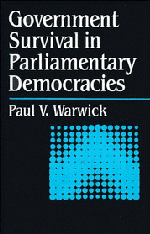Book contents
- Frontmatter
- Contents
- List of tables and figures
- Preface
- GOVERNMENT SURVIVAL IN PARLIAMENTARY DEMOCRACIES
- 1 Introduction: the government survival debates
- 2 The quantitative study of government survival
- 3 Basic attributes and government survival
- 4 The role of ideology
- 5 Economic conditions and government survival
- 6 The underlying trend in government survival
- 7 Model adequacy
- 8 Conclusion: an alternative perspective on government survival
- Appendix: a codebook of variables used in this study
- Notes
- References
- Index
3 - Basic attributes and government survival
Published online by Cambridge University Press: 19 September 2009
- Frontmatter
- Contents
- List of tables and figures
- Preface
- GOVERNMENT SURVIVAL IN PARLIAMENTARY DEMOCRACIES
- 1 Introduction: the government survival debates
- 2 The quantitative study of government survival
- 3 Basic attributes and government survival
- 4 The role of ideology
- 5 Economic conditions and government survival
- 6 The underlying trend in government survival
- 7 Model adequacy
- 8 Conclusion: an alternative perspective on government survival
- Appendix: a codebook of variables used in this study
- Notes
- References
- Index
Summary
Most empirical investigations of government survival have relied on fairly simple sets of fixed attributes of governments, party systems, and/or regimes as their causal factors. Not only are time-varying influences omitted from these studies, but factors based on the ideological or policy positions of parties in the government are also absent. While it is my intention to introduce these considerations to the analysis, their contribution can be assessed most readily if we start with covariates of the type utilized in earlier work.
As we have seen, the most important recent example of that work was conducted by King et al. (1990), using a data set created by Strom (1985, 1990a). The set of covariates that will be evaluated in this chapter corresponds closely to that considered in the KABL study; some covariates suggested by other research are included as well. Although the selection of covariates is similar, the sequence in which they will be evaluated is not. King et al.'s procedure was to start with country or regime attributes, then add party structure attributes and, finally, attributes of the governments themselves. The position adopted here is that the immediate causes of government survival ought to reside mainly with the governments themselves; if party or parliamentary system factors play a role, it is often because they influence or constrain the composition of governments. Therefore, rather than working from the outside in, I shall begin with the factors closest to survival, the characteristics or attributes of governments.
- Type
- Chapter
- Information
- Government Survival in Parliamentary Democracies , pp. 34 - 48Publisher: Cambridge University PressPrint publication year: 1995



